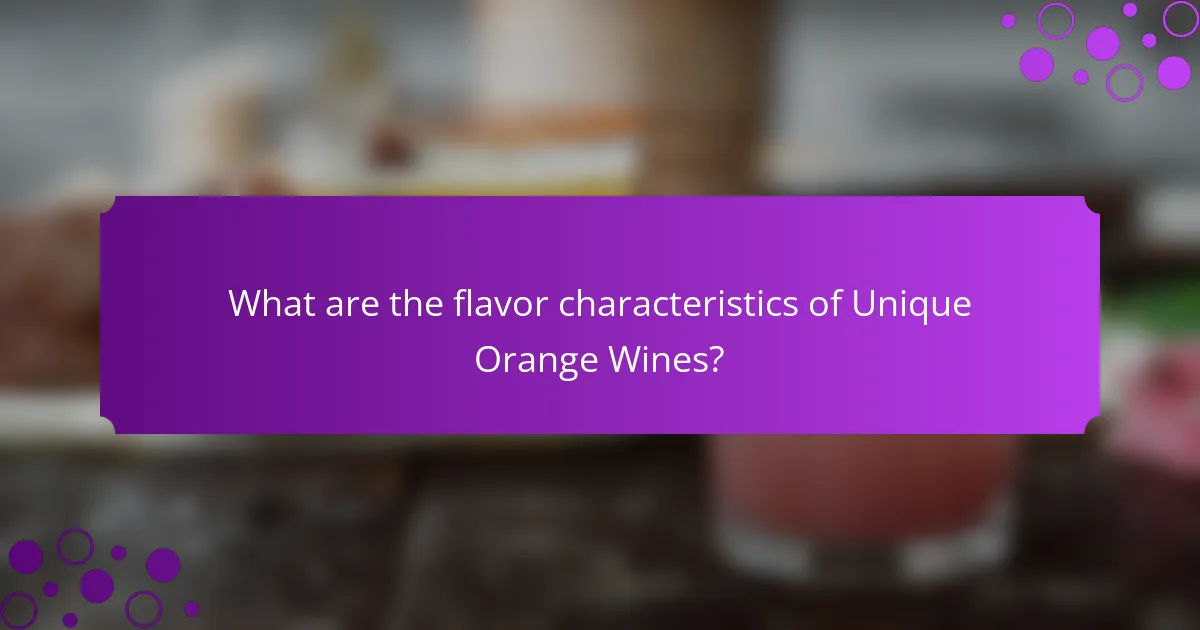
What are Unique Orange Wines?
Unique orange wines are a type of white wine made from white grapes. They are distinct due to their extended skin contact during fermentation. This process imparts an orange hue to the wine. The skin contact can last from days to months. As a result, orange wines often exhibit tannins similar to red wines. They also showcase a range of flavors, including stone fruit, nuts, and spices. Unique production techniques, such as using amphorae or traditional methods, contribute to their distinctiveness. Orange wines have gained popularity for their complex profiles and food pairing versatility.
How are Unique Orange Wines different from traditional wines?
Unique orange wines differ from traditional wines primarily in their production method. Orange wines are made by fermenting white grapes with their skins, similar to red wine production. This skin contact imparts a distinct color and tannins, giving orange wines a unique flavor profile. Traditional white wines typically involve pressing grapes and fermenting the juice without skins. The absence of skin contact in traditional wines results in lighter colors and different taste characteristics. Additionally, orange wines often exhibit complex aromas and flavors, including notes of stone fruit, nuts, and spices. This complexity arises from the extended fermentation process and the influence of the grape skins.
What defines the color and appearance of Unique Orange Wines?
Unique Orange Wines are defined by their amber to deep orange hue. This color results from extended skin contact during fermentation. The grape varieties used also influence the shade. Common varieties include Pinot Grigio and Sauvignon Blanc. Additionally, the winemaking process can affect clarity and opacity. Some wines may appear cloudy due to minimal filtration. The aging process in oak barrels can impart further color variations. Overall, the unique appearance is a hallmark of their production method.
What grape varieties are commonly used in Unique Orange Wines?
Common grape varieties used in unique orange wines include Pinot Grigio, Chardonnay, and Sauvignon Blanc. These varieties are often chosen for their ability to develop complex flavors during extended skin contact. Pinot Grigio, for instance, can impart a rich texture and fruity notes. Chardonnay is known for its versatility and can contribute creamy and nutty characteristics. Sauvignon Blanc adds vibrant acidity and aromatic qualities. Other notable varieties include Riesling and Gewürztraminer, which can enhance floral and spicy notes. The selection of these grapes is crucial in crafting distinctive orange wines with unique flavor profiles.
What are the historical origins of Unique Orange Wines?
Unique Orange Wines originated in ancient winemaking practices. They date back over 6,000 years, primarily in the region of Georgia. The traditional method involves fermenting white grapes with their skins. This technique enhances flavor and color, resulting in the unique orange hue. Historical artifacts, such as clay vessels called qvevri, confirm this practice. Qvevri are used for fermentation and aging, showcasing the deep-rooted culture of orange wine production. The method spread to various regions, influencing winemaking styles across Europe. Today, orange wines are celebrated for their distinct taste and complexity.
How has the production of Unique Orange Wines evolved over time?
The production of Unique Orange Wines has evolved significantly over time. Initially, these wines were made using ancient techniques, primarily in regions like Georgia. Winemakers utilized skin contact fermentation, allowing the wine to extract more tannins and color from the grape skins. This method dates back thousands of years and has seen a resurgence in recent decades.
In the late 20th century, interest in orange wines grew, particularly among natural wine producers. They began to embrace traditional methods, often using minimal intervention and organic grapes. This shift was driven by a desire for authenticity and unique flavor profiles.
Today, the production of orange wines incorporates modern technology alongside traditional practices. Winemakers experiment with various grape varieties and fermentation techniques. The result is a diverse range of flavors and styles, appealing to a broader audience.
The evolution of Unique Orange Wines reflects changing consumer preferences and a growing appreciation for artisanal methods. As awareness of these wines continues to spread, their production techniques will likely keep evolving.
What regions are most famous for producing Unique Orange Wines?
Famous regions for producing unique orange wines include Friuli-Venezia Giulia in Italy, and Georgia. Friuli-Venezia Giulia is renowned for its traditional methods and indigenous grape varieties. Georgia is considered the birthplace of orange wine, with a history dating back over 8,000 years. Other notable regions include Slovenia, particularly the Goriška Brda area, and parts of the Balkans. These regions utilize extended skin contact during fermentation, which is essential for creating orange wines. The unique terroir and climate in these areas contribute to the distinctive flavors and characteristics of the wines produced.

What are the production techniques for Unique Orange Wines?
Unique orange wines are produced using specific techniques that differentiate them from traditional white and red wines. The primary technique involves skin contact during fermentation. This process allows the juice to extract color, tannins, and flavors from the grape skins.
Typically, white grape varieties are used, such as Pinot Grigio or Sauvignon Blanc. The grapes are crushed, and the skins remain in contact with the juice for days to weeks. This duration can vary based on the desired flavor profile and style of the wine.
Another technique is the use of amphorae or clay vessels for fermentation and aging. This method promotes micro-oxygenation, enhancing the wine’s complexity.
Unique orange wines may also undergo malolactic fermentation. This secondary fermentation softens acidity and adds creaminess to the wine.
Additionally, some producers use minimal intervention techniques. This includes natural yeasts and no added sulfites, allowing the wine to express its terroir.
These production methods contribute to the distinctive taste and character of unique orange wines, making them sought after by enthusiasts.
How is the fermentation process unique for Orange Wines?
The fermentation process for Orange Wines is unique due to the extended skin contact during fermentation. This technique involves fermenting white grapes with their skins, which is typically not done for traditional white wines. The skin contact can last from several days to months, allowing the extraction of tannins, phenolics, and color. This results in a wine with a richer texture and complexity. The process also enhances the aromatic profile, contributing to the wine’s distinct flavor characteristics. Orange Wines often exhibit flavors such as dried fruits, nuts, and spices, which are influenced by this unique fermentation method.
What role does skin contact play in the production of Unique Orange Wines?
Skin contact is essential in the production of Unique Orange Wines. It involves fermenting white grape varieties with their skins. This process extracts tannins, phenolics, and color compounds from the skins. The duration of skin contact can vary, influencing the wine’s flavor and texture. Longer skin contact typically results in more complexity and a deeper color. This technique differentiates orange wines from traditional white wines. Research indicates that skin contact enhances the aromatic profile and mouthfeel. It contributes to the unique characteristics that define orange wines.
How does the aging process affect the characteristics of Unique Orange Wines?
The aging process significantly alters the characteristics of Unique Orange Wines. As these wines age, they develop more complex flavors. Common flavor notes include dried fruit, nuts, and spices. The tannins also soften over time, leading to a smoother mouthfeel. Additionally, oxidation during aging can enhance the wine’s aroma. This process can introduce earthy or floral notes that were not present in younger wines. Aging can also affect the wine’s color, often resulting in a deeper hue. Research indicates that aging can improve the overall balance and harmony of the wine. These changes contribute to the unique profile of orange wines as they mature.
What equipment is essential for producing Unique Orange Wines?
Essential equipment for producing unique orange wines includes fermentation vessels, pressing equipment, and temperature control systems. Fermentation vessels, such as open-top fermenters or stainless steel tanks, allow for skin contact during fermentation. Pressing equipment, like a wine press, is crucial for extracting juice from the grape skins. Temperature control systems ensure optimal fermentation conditions, which can affect flavor development. Additionally, bottling equipment is needed for packaging the finished wine. Each piece of equipment plays a significant role in the unique production process of orange wines.
What types of fermentation vessels are commonly used?
Common types of fermentation vessels include stainless steel tanks, oak barrels, and glass carboys. Stainless steel tanks are favored for their durability and ease of cleaning. They also allow for precise temperature control during fermentation. Oak barrels impart unique flavors and tannins to the wine. They are often used for aging and can enhance the complexity of the final product. Glass carboys are typically used for small batch fermentation. They allow for easy monitoring of the fermentation process. Each vessel type contributes distinct characteristics to the fermentation process, influencing the final flavor profile of the wine.
How does temperature control impact the production of Unique Orange Wines?
Temperature control significantly impacts the production of Unique Orange Wines. It affects fermentation rates and flavor extraction. Optimal temperatures enhance the release of phenolic compounds. These compounds contribute to the wine’s distinctive color and taste. Cooler temperatures can slow fermentation, preserving fruity aromas. Conversely, higher temperatures may accelerate fermentation, leading to more robust flavors. Studies indicate that temperature variations can alter the balance of acidity and sweetness. Consistent temperature management ensures a stable fermentation process. This ultimately results in a more refined and complex wine profile.

What are the flavor characteristics of Unique Orange Wines?
Unique Orange Wines typically exhibit a range of complex flavor characteristics. These wines often showcase flavors of stone fruits like apricot and peach. Citrus notes, particularly orange and lemon, are also prevalent. Additionally, unique orange wines can present herbal and floral undertones. The tannins in these wines contribute to a textured mouthfeel. This structure enhances the wine’s overall complexity. The fermentation process with grape skins adds depth and richness. Many orange wines also develop a slight nuttiness or oxidative quality over time. These characteristics result from the unique production techniques used in their creation.
How do the flavors of Unique Orange Wines compare to other wines?
Unique Orange Wines exhibit distinct flavors compared to other wines. They are known for their tannic structure and complex flavor profile. The production process involves extended skin contact, which contributes to their unique taste. This results in flavors that can include citrus, stone fruits, and herbal notes. In contrast, white wines typically have lighter, crisper flavors without the tannins. Red wines, on the other hand, have more pronounced berry and oak characteristics. Studies show that the flavor complexity of Orange Wines can rival that of high-quality reds. This complexity is enhanced by the use of various grape varieties and fermentation techniques.
What common flavor profiles can be found in Unique Orange Wines?
Unique Orange Wines typically exhibit flavor profiles that include notes of citrus, stone fruits, and herbal undertones. Common flavors often found are orange zest, apricot, and peach. These wines may also present a slight nuttiness or oxidative qualities. The tannic structure can contribute to a savory aspect, enhancing the overall complexity. The fermentation process, often involving skin contact, influences the depth of flavor. This technique allows for greater extraction of phenolic compounds, which can add texture and richness. Additionally, the use of various grape varieties can lead to unique combinations of these flavor characteristics.
How does the terroir influence the taste of Unique Orange Wines?
Terroir significantly influences the taste of Unique Orange Wines. Terroir encompasses the soil, climate, and topography of a vineyard. These factors affect grape growth and development. Soil composition impacts mineral content and drainage. Different soil types can contribute unique flavors to the wine. Climate determines the ripeness and acidity of the grapes. Warmer climates may produce bolder flavors, while cooler climates can enhance acidity. Topography influences sunlight exposure and temperature variations. These variations lead to distinct flavor profiles in Unique Orange Wines. For example, wines from volcanic soils often exhibit minerality. Thus, terroir plays a crucial role in defining the sensory experience of these wines.
What aromas are typically associated with Unique Orange Wines?
Unique Orange Wines typically exhibit aromas of citrus, stone fruits, and herbs. Common citrus notes include orange peel and lemon zest. Stone fruits such as apricot and peach are also prevalent. Additionally, herbal aromas like chamomile and thyme may be present. These wines often have a complex aromatic profile due to extended skin contact during fermentation. This process enhances the extraction of volatile compounds, contributing to their unique scent. The diversity of aromas can vary based on grape variety and production methods.
What factors contribute to the aromatic complexity of Unique Orange Wines?
Unique Orange Wines exhibit aromatic complexity due to several key factors. The skin contact during fermentation significantly influences their aroma. This process extracts phenolic compounds and essential oils from the grape skins. The choice of grape variety also impacts the aromatic profile. Different varieties contribute unique flavor notes and characteristics. Additionally, the fermentation vessel type can alter the wine’s aroma. For instance, oak barrels impart distinct vanilla and spice notes. The aging process further enhances complexity through oxidation and interaction with the vessel. Lastly, the terroir, including soil composition and climate, affects the grape’s aromatic potential. Each of these factors plays a crucial role in defining the aromatic complexity of Unique Orange Wines.
How do aging and oak influence the aromas of Unique Orange Wines?
Aging and oak significantly enhance the aromas of Unique Orange Wines. Aging allows for the development of complex aromas through oxidation and evaporation. This process can introduce notes of dried fruits, nuts, and spices. Oak barrels contribute additional characteristics such as vanilla, toast, and smoke. The interaction between the wine and the wood also promotes the integration of these aromas. The length of aging can further intensify these aromatic profiles. Research indicates that wines aged in oak can exhibit a broader aromatic range compared to those aged in stainless steel. This combination results in a distinctive aromatic complexity that defines Unique Orange Wines.

What are the best serving suggestions for Unique Orange Wines?
Serve Unique Orange Wines chilled between 50 to 55 degrees Fahrenheit. This temperature enhances their aromatic qualities and flavor profiles. Pair them with flavorful dishes such as roasted vegetables or grilled seafood. The wine’s acidity complements these foods well. Consider using wine glasses with a wider bowl. This allows for better aeration and aroma release. Unique Orange Wines also pair nicely with cheeses, especially aged varieties. Their tannins and complexity can balance richer cheese flavors. Experiment with various food pairings to discover personal preferences.
How should Unique Orange Wines be served for optimal enjoyment?
Unique Orange Wines should be served slightly chilled, ideally between 50°F and 55°F. This temperature enhances the wine’s complex flavors and aromas. Use a white wine glass to allow for better aeration. Pour the wine gently to minimize agitation. Pair Unique Orange Wines with food that complements their unique characteristics. Dishes like roasted vegetables, seafood, or cheese work well. Serving these wines with the right food enhances the overall tasting experience.
What glassware is recommended for serving Unique Orange Wines?
The recommended glassware for serving unique orange wines is a white wine glass. This type of glass has a narrower bowl, which helps concentrate the aromas. The shape allows for better aeration of the wine. A tulip-shaped glass can also be suitable. It enhances the wine’s complexity and showcases its unique characteristics. The glass should have a thin rim for a better tasting experience. This design helps highlight the wine’s flavors and aromas effectively.
What is the ideal serving temperature for Unique Orange Wines?
The ideal serving temperature for unique orange wines is between 50°F and 55°F (10°C to 13°C). This temperature range allows the complex flavors and aromas of orange wines to be fully expressed. Serving orange wines too cold can mute their characteristics. Conversely, serving them too warm can enhance bitterness and reduce freshness. Studies indicate that this temperature range maximizes the enjoyment of their distinctive profiles.
What food pairings complement Unique Orange Wines?
Unique Orange Wines pair well with a variety of foods. Dishes with rich flavors complement their complexity. Grilled seafood enhances the wine’s acidity and fruitiness. Roasted vegetables bring out the earthy notes in the wine. Spicy Asian cuisine balances the wine’s tannins and texture. Charcuterie boards featuring cured meats work harmoniously with the wine’s profile. Cheese, particularly aged varieties, matches well with the bold flavors. These pairings create a balanced dining experience that showcases the unique characteristics of Orange Wines.
Which cuisines work best with Unique Orange Wines?
Unique Orange Wines pair best with Mediterranean and Asian cuisines. Mediterranean dishes often feature rich flavors that complement the wine’s complexity. Examples include roasted vegetables, seafood, and grilled meats. Asian cuisines, particularly those with umami profiles, also work well. Dishes like sushi, Thai curries, and stir-fries enhance the wine’s unique taste. The acidity and tannins in orange wines balance well with these flavors. This pairing is supported by sommeliers who recommend these cuisines for a harmonious dining experience.
What specific dishes enhance the experience of Unique Orange Wines?
Unique Orange Wines pair well with specific dishes that complement their flavors. Dishes like roasted chicken with herbs enhance the wine’s complexity. Grilled seafood, such as octopus or shrimp, also works well. Spicy Asian cuisine, including Thai or Indian dishes, balances the wine’s acidity. Aged cheeses, particularly those with nutty flavors, create a harmonious match. Mushroom risotto brings out the earthy notes in the wine. Charcuterie boards featuring cured meats provide a savory contrast. These pairings are supported by the wine’s unique characteristics, which include tannins and oxidative notes that interact positively with various flavors.
What tips can enhance the experience of drinking Unique Orange Wines?
To enhance the experience of drinking unique orange wines, serve them slightly chilled at around 50-55°F. This temperature allows the complex flavors to shine. Pair unique orange wines with foods that complement their tannins and acidity, such as charcuterie or rich cheeses. Use large, wide glasses to allow the wine to breathe and release its aromas. Take time to swirl the wine in the glass before tasting. This action helps to aerate the wine, enhancing its bouquet. Focus on the flavors and aromas during the tasting process. Noting the wine’s unique characteristics can deepen appreciation. Finally, consider exploring different producers and regions to understand the diversity within orange wines.
Unique orange wines are a distinct category of white wine characterized by their production method, which involves fermenting white grapes with their skins, resulting in an amber to deep orange hue and tannins similar to red wines. This article explores the unique production techniques, flavor characteristics, and historical origins of orange wines, highlighting common grape varieties used and the impact of terroir on their taste. It also provides serving suggestions, ideal food pairings, and tips for enhancing the drinking experience, emphasizing the complexity and versatility of unique orange wines in the culinary world.